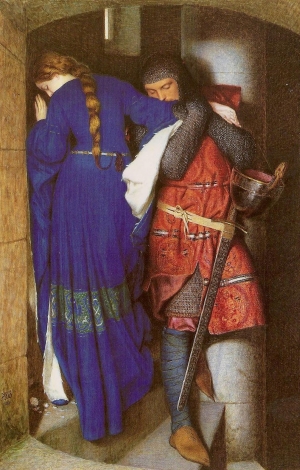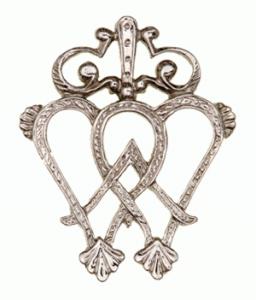Sir Walter Scott scrisse la poesia “The English Ladye and the Knight” nel 1805 (in “The Lay of the Last Minstrel”). Qualche secolo più tardi Loreena McKennitt ne mise buona parte in musica per il suo “An Ancient Muse” (2006)
In The English Ladye and the Knight si narra di un amore sfortunato, una storia alla Romeo e Giulietta, che invece di appartenere a due diverse casate di Verona, stanno uno al di qua e l’altra aldilà del Border, quella terra che nel Medioevo era il Far West dell’Isola, teatro di scorrerie, sanguinose battaglie e faide. E Sir Walter Scott ne fu il portavoce; la maggior parte della storia e leggende sul Border scozzese ci viene dal suo illustre figlio, il quale riportò (ricamandoci anche un po’ sopra) nel suo Minstrelsy of the Scottish Border (1833) tutto quello che alla sua epoca ancora si conosceva del passato, rifacendosi ad una lunga tradizione orale: si narra di un medioevo oscuro ma anche più libero, in cui c’era appunto la libertà di muoversi per i territori e soprattutto di esprimersi più liberamente continua
THE SUN SHINES FAIR ON CARLISLE WALL

Così scrive Loreena McKennith nelle note del Booklet allegato al cd “In the song “An English Ladye”, this is a segment of a very long narrative poem by Sir Walter Scott called The Lay of the Last Minstrel and what fascinated me by this corner of this long narrative, it’s situated at Carlisle Castle. Now, Carlisle Castle is built on an ancient Celtic settlement site so there was that kind of Celtic archaeological moment. But also in the story it reflects upon a sort of Romeo and Juliet story where a Scottish knight falls in love with an English woman, and follows a theme that love often transcends cultural barriers. And in this story, the brother of this English lady finds it intolerable that his sister should be in love with a Scottish knight and he murders his sister. The Scottish knight comes and then murders the brother and then in this depth of passionate grief, he decides to go on and fight a war for the love of this woman that died. And then in the last verse you hear that he goes off to fight this war in Palestine. And what’s quite fascinating is that of course Palestine is a place that is very much in our contemporary minds and lives, and the troubles there. And I just thought it was an interesting note, you might say, where yes, this is a historical piece of literature but in actual fact, as with history, history is never really truly dead, that history is really the underpinnings of our contemporary times. And the poem also caused me to reflect on certainly one of the reasons why some people go off to war or have gone off to war.”
La melodia è malinconica, i toni sono mesti e cupi con quelle campane che rintoccano a morto e gli archi e cori che richiamano un lamento funebre
La poesia “The English Ladye and the Knight” doveva aver commosso molti cuori e soprattutto con quell'”Amore avrà sempre su tutto signoria” contribuito alla diffusione dell’amore romantico.
Le due frasi del refrain le ritroviamo in questa versione ottocentesca di The Cruel Mother dove però “Amore” si trasforma misteriosamente ovvero per assonanza in “Leone“!.
I
It was an English ladye bright,
(The sun shines fair on Carlisle wall,)
And she would marry a Scottish knight,
For Love will still be lord of all.
II
Blithely they saw the rising sun
When he shone fair on Carlisle wall;
But they were sad ere day was done,
Though Love was still the lord of all.
III
Her sire gave brooch and jewel fine,
Where the sun shines fair on Carlisle wall;
Her brother gave but a flask of wine,
For ire that Love was lord of all.
IV
For she had lands both meadow and lea,
Where the sun shines fair on Carlisle wall,
For he swore her death, ere he would see
A Scottish knight the lord of all.
V
That wine she had not tasted well
(The sun shines fair on Carlisle wall)
When dead, in her true love’s arms, she fell,
For Love was still the lord of all!
VI
He pierced her brother to the heart,
Where the sun shines fair on Carlisle wall –
So perish all would true love part
That Love may still be lord of all!
VII
And then he took the cross divine,
Where the sun shines fair on Carlisle wall,
And died for her sake in Palestine;
So Love was still the lord of all.
VIII
Now all ye lovers, that faithful prove,
(The sun shines fair on Carlisle wall)
Pray for their souls who died for love,
For Love shall still be Lord of all.
I
C’era una bionda dama inglese
(il sole splende bello sul castello di Carlisle(1)
e avrebbe sposato un cavaliere scozzese
perché Amore avrà sempre su tutto signoria
II
Con gioia videro il sorgere del sole
che splende bello sul castello di Carlisle
ma divennero tristi alla fine del giorno
anche se Amore aveva sempre su tutto signoria
III
Il suo cavaliere le diede la spilla(2) e dei bei gioielli
Quando il sole splende bello sul castello di Carlisle
e suo fratello(3) le diede solo un bottiglia di vino
per odio che Amore avesse su tutto signoria
IV
Perché lei aveva terre sia coltivate che a maggese
dove il sole splende bello sul castello di Carlisle
e lui giurò sulla sua morte, che mai avrebbe voluto vedere/un cavaliere scozzese su tutto signore
V
Quel vino non aveva un buon sapore
(il sole splende bello sul castello di Carlisle)
che morta tra le braccia del suo vero amore cadde
perché Amore può avere sempre su tutto signoria
VI
Allora lui pugnalò il fratello di lei al cuore
quando il sole splende bello sul castello di Carlisle
che morisse ciò che separa dal vero amore(4)
così Amore aveva sempre su tutto signoria
VII
E poi lui prese la croce divina,
quando il sole splende bello sul castello di Carlisle
e morì per lei in Palestina;
Quindi l’Amore era ancora il signore di tutti.
VIII
Cosi o voi amanti, che date prova di fedeltà
(il sole splende bello sul castello di Carlisle)
pregate per coloro che morirono per amore
perché Amore ha sempre su tutto signoria

NOTE – traduzione italiana di Cattia Salto
1) Carlisle castle si trova in Cumbia al confine tra Inghilterra e Scozia
2) la spilla d’argento è un dono tradizionalmente regalato alla sposa in vista del matrimonio. In Scozia prende il nome di Spilla Luckenbooth il quale deriva dalle bancarelle che si trovavano stabilmente nell’antico mercato lungo la Royal Mile di Edimburgo fin dal Tardo Medioevo e dove si vendevano anche i gioielli; queste bancarelle di notte erano chiuse con i lucchetti ossia “locked”.
Nel linguaggio dell’amore due cuori intrecciati significano condividere lo stesso sentimento d’amore uno per l’altro.
E’ una spilla della tradizione scozzese di solito in argento e con incisi due cuori intrecciati, variamente lavorata anche con pietre incastonate: è un regalo di fidanzamento che viene indossato durante il matrimonio e che passerà al primogenito, la spilla stessa è un amuleto che protegge la nuova coppia dall’invidia delle fate o più in generale dal male, favorendo la nascita di un bambino.
3) i fratelli crudeli sono un argomento topico delle ballate medievali, questo non volendo imparentarsi con uno “scozzese” preferisce uccidere la sorella. E così la faida ha inizio!
(4) una traduzione molto a senso
FONTI
https://archive.org/stream/layoflastminst00scot/layoflastminst00scot_djvu.txt
http://laviejamusa.blogspot.it/2008/11/english-ladye-and-knight-it-was-english.html
